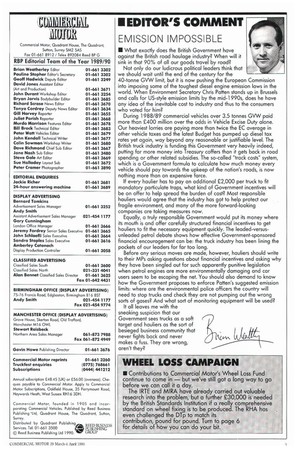EMISSION IMPOSSIBLE
Page 5

If you've noticed an error in this article please click here to report it so we can fix it.
• What exactly does the British Government have against the British road haulage industry? When will it sink in that 90% of all our goods travel by road?
Not only do our ludicrous political leaders think that we should wait until the end of the century for the 40-tonne GVW limit, but it is now pushing the European Commission into imposing some of the toughest diesel engine emission laws in the world. When Environment Secretary Chris Patten stands up in Brussels and calls for US-style emission limits by the mid-1990s, does he have any idea of the inevitable cost to industry and thus to the consumers who voted for him?
During 1988/89 commercial vehicles over 3.5 tonnes GVW paid more than £400 million over the odds in Vehicle Excise Duty alone. Our heaviest lorries are paying more than twice the EC average in other vehicle taxes and the latest Budget has pumped up diesel tax rates yet again, way beyond any reasonable or justifiable level. The British truck industry is funding this Government very heavily indeed, putting far more money into Treasury coffers than it gets back in rood spending or other related subsidies. The so-called "track costs" system, which is a Government formula to calculate how much money every vehicle should pay towards the upkeep of the nation's roads, is now nothing more than an expensive farce.
If every haulier has to pay an additional £2,000 per truck to fit mandatory particulate traps, what kind of Government incentives will be on offer to help spread the burden of cost? Most responsible hauliers would agree that the industry has got to help protect our fragile environment, and many of the more forward-looking companies are taking measures now, Equally, a truly responsible Government would put its money where its mouth is and offer carefully structured financial incentives to get hauliers to fit the necessary equipment quickly. The leaded-versusunleaded petrol debate shows how effective Government-sponsored financial encouragement can be: the truck industry has been lining the pockets of our leaders for far too long.
Before any serious moves are made, however, hauliers should write to their MPs asking questions about financial incentives and asking why they have been singled out for such apparently punitive legislation when petrol engines are more environmentally damaging and car users seem to be escaping the net. You should also demand to know how the Government proposes to enforce Patten's suggested emission limits: where are the environmental police officers the country will need to stop trucks and check they are not pumping out the wrong sorts of gases? And what sort of monitoring equipment will be used?
It all leaves me with the sneaking suspicion that our Government sees trucks as a soft target and hauliers as the sort of besieged business community that never fights back and never makes a fuss. They are wrong, aren't they?




































































































































































